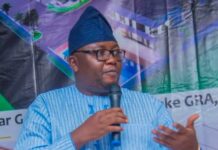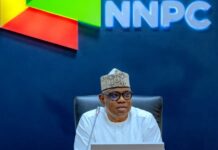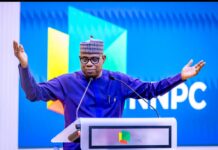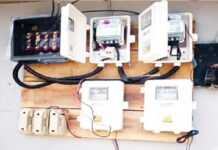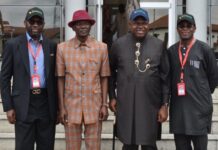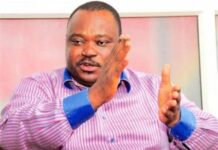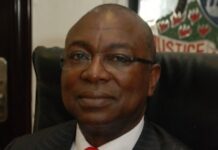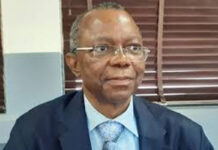Ainojie ‘Alex’ Irune is the Chief Operating Officer, Oando Energy Resources (OER )
A proponent of transformational leadership, Dr. Irune has over 15 years’ experience garnered in both the oil and gas and automotive industries. He joined Oando PLC in 2011 and is currently an Executive Director on the Board as well as the Chief Operating Officer, Oando Energy Resources (OER); Africa’s leading exploration and production company and the Upstream subsidiary of Oando PLC. He leads OER with a focus on technical and commercial innovation with the goal of maintaining the long-term sustainable success of the business.
As COO, he has operational oversight of 16 onshore and offshore assets across Nigeria and Sao Tome & Principe. Since taking on the role in 2018, he has successfully redefined OER’s business model, instituting and leading Joint Venture Improvement Initiatives deploying solutions to mitigate production inefficiencies, significantly reduce costs while increasing production. Actions that culminated in a 17% increase in incremental production and over $43 million in cost savings for the JVs. In addition, he secured over $1.5 billion in international financing for incremental production and in excess of $500m in working capital financing In this special focus interview with Eleni Giokos on CNN’s Connecting Africa, he discussed sustainable solutions to achieving energy independence and driving economic prosperity on the African continent. Excepts
As one of the largest oil and gas companies on the continent why is it time for you to pivot into renewable energy?
Globally there is certainly that mind frame across pretty much every oil and gas company today. We see a lot of shits happening and Eleni if you allow me to speak to some of those.
The first is the fact that the pandemic has taken away the notion of this heavy oil dependency. We see that a lot of the renewable assets were easier to manage through this period, when I say easier, I’m talking from an attention to equipment perspective. Its only sustainable from a business standpoint to look to a future that’s renewable. It certainly is what we’re focusing on, we’ve pivoted to understand what that space requires but most importantly starting to drive the steps to create the investment in that space.
You’ve built 300kilomteres worth of gas pipeline suppling gas into coca cola and Dangote and other industries as well how important is it to think ahead in trying to help businesses move away from the reliance of fuel and diesel?
Gas is a key component of that transition. We see gas playing a huge role in the energy mix moving forward, with gas as the catapult that will certainly move Africa into an industrialize phase. Renewables from cost perspective present a bit of a challenge for the continent, all the same it’s not taken out of the equation it’s certainly something we’ll continue to look at and invest in but we see gas being the immediate transition and the support structure.
What impact does the African continental free trade agreement going to have on the oil and gas industry, on renewables, and generally trading in power from country to country do you think that’s a dream we could actually see?
We as a country export a significant amount of our crude to European countries and Asia whilst the rest of Africa in a sense that requires these products, isn’t able to trade as freely. And this is no fault of the government you know, it’s about the union, is about creating this free trade like you talked about, borderless countries, the movement of value across the borders to enhance the development of this continent.
So Oando owns one of the turbines to that helps national grid get back online when there is a power outage, so how important is the private sector involvement in handling the backing infrastructure to support the national grid?
It’s exciting when you’re able to develop your assets and supply gas in conjunction with the government to you know to a plant of this nature. But what’s more exciting is that we can take this model and duplicate it and create more of this around the country. Certainly, the private sector has a huge role to play, investment is required, the country is open for business and I think it’s important that as private sector players we realize that the provision of electricity whether it be capture power or grid power its solely not the government’s role.
You know that upskilling people is so vital specifically in the space that you’re in what about the renewable energy sector. We relying on importation of hardware, how do we localize?
Whatever we choose to do has to sustainable as a continent. Moving into that renewable energy space, we must ensure that whatever technologies we choose to go with we can bring those supply chain into the country, develop the skills, ensure that the feed stock is here localized, ensure that the manufacturing and production is localize, and ensure that the distribution channels and consumption is possible. In the event we can’t, it’s clear the reliance for source or feed stock will have to come from other countries and from an energy independence standpoint, we want to focus on the sources that can be localize, we create jobs just like we have with gas and oil able to resource ourselves from our backyard and provide the much needed power. The geek economic relies on one thing, power, I don’t think we’ll be talking about computers communication, internet of things, big data, without power. So if Africa is going to play a significant role in that economy then we must gear ourselves up to at least have the foundation to do so.
And as Africa’s renewable energy projects take off a more diversified energy portfolio in Africa has the potential to power up the continent.
When we talk about electrification, I think we have a model that will work for the continent which is captive power captive power takes you into the local areas that require the power you move away from the large scale grid investments that are crippling for our poorly funded government but you’re able to create power for the microcosms that make up the effectively there some of the parts that’s how you go about this and I think in Africa we figured this out. So, when we talk about pan African trade, for me to get power to you I have to create infrastructure






